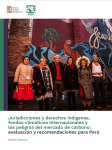10 Dec 2012
Dear Friends,The importance of ensuring respect for the rights of forest peoples’ to control their forests, lands and livelihoods, becomes ever clearer and yet more contested. As the articles in this edition of our newsletter starkly reveal, land and resource grabs are not just being imposed by commercial developers but are being actively promoted by governments, whose principle responsibility should be to protect the rights of citizens. Yet these same impositions are also being resisted, sometimes at great personal cost, by local communities and indigenous peoples.


















